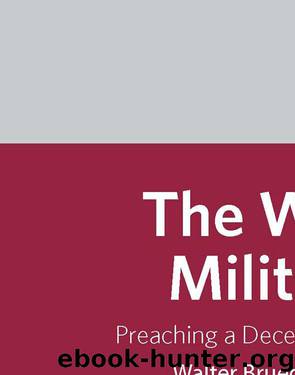Word Militant by Brueggemann Walter

Author:Brueggemann, Walter
Language: eng
Format: epub
Publisher: Fortress Press
II
Having said that, it is clear that the community that both generated and lived through the Old Testament had to live in the real world. The real world that they inhabited, the same moral world we, their belated heirs inhabit, is not so neat and clean and one-dimensional as these dominant lines of moral coherence might suggest. As a result, one can detect a variety of literary-rhetorical strategies that intend either to open the moral arena of Israel beyond the tight traditions of command and wisdom to allow for the slippages that are inevitable in lived reality, or to destabilize these high, starchy claims in order to permit less severe ways of thinking. Here I will consider four such strategies, none of which in the end prevails, but all of which persist in the text of the Old Testament and, by their existence, de-absolutize the clean “either/or” of Deuteronomy 30:15–20 and Proverbs 8:32–36.
The first of these alternative strategies is found in the exodus narrative (Exod. 1–15).10 This narrative functions as Israel’s founding act of liturgical imagination.11 In this well-known, oft-repeated narrative, there are three players, YHWH, who wills freedom for Israel; Pharaoh, who resists the freedom YHWH intends; and Israel, who is represented by Moses (and Aaron). The fact that there are three players (instead of the usual two of Sinai and wisdom) already indicates a more complicated plot with much more maneuverability in the moral conclusions that can be drawn.
In this plot our interest concerns the third party, Israel. About that player in the narrative, we will ask to what extent Israel is sinner and to what extent “sinned against.” Israel is represented in the narrative by Moses, who is only a modest actor in the key transactions that take place between YHWH and Pharaoh. Israel is in a situation of wretchedness, being ruthlessly abused and helpless to extricate itself from the situation. What interests us is the fact that Israel is in this miserable situation through no fault of its own. Israel is not said to have sinned. Indeed, in Genesis 47:13–26, we are given a review of the economic-political processes by which such a marginated people as the Hebrews became slaves, inured to the imperial production system by the brutality of supply and demand, and by the manipulation of mortgages and taxes.
It is evident that Pharaoh and his agent, Joseph, have acted against the radical notion of justice fostered in Israel and have reduced the Israelites to pawns in the service of imperial projects. As long as the social struggle of the Israelites involves only two parties, Israel and Pharaoh, Israel is a hopeless, hapless victim of the enormous, ruthless power of Pharaoh, who obeys no law but his own. Thus, Israel is indeed a victim of a social circumstance that happened through no fault of its own, but it nonetheless suffers mightily at the hands of the perpetrator, Pharaoh.
The exodus narrative proper, however, does not get under way until Exodus 2:23–25. It is remarkable that in
Download
This site does not store any files on its server. We only index and link to content provided by other sites. Please contact the content providers to delete copyright contents if any and email us, we'll remove relevant links or contents immediately.
| Adult Ministry | Children's Ministry |
| Counseling & Recovery | Discipleship |
| Evangelism | Missions & Missionary Work |
| Preaching | Sermons |
| Youth Ministry |
Victory over the Darkness by Neil T. Anderson(2850)
The Rape Of Nanking by Iris Chang(2805)
Chosen by God by R. C. Sproul(2150)
Habits of Grace by David Mathis(1973)
Crash the Chatterbox by Steven Furtick(1965)
Knowing God by J.I. Packer(1843)
How To Be Born Again by Billy Graham(1773)
A Prophet with Honor by William C. Martin(1714)
Gospel-Shaped Marriage by Chad van Dixhoorn(1705)
Peace with God by Billy Graham(1675)
Confronting Christianity by Rebecca McLaughlin(1575)
God's Smuggler by Brother Andrew(1534)
Angel Dreams by Virtue Doreen Virtue Melissa(1468)
Whisper by Mark Batterson(1452)
The School of Biblical Evangelism by Ray Comfort(1424)
Missionaries by Norman Lewis(1422)
The Truth War by John MacArthur(1420)
The Poems of Rowan Williams by Rowan Williams(1350)
Do Greater Things by Robby Dawkins(1318)
